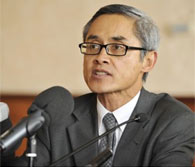September 7, 2011. We were in the immense ballroom of the five-star Shangri-la Hotel in Bangkok. Crystal chandeliers sparkled above. Two hundred people were there. Professor Vitit Muntarbhorn, perhaps the best known expert on international human rights law in Asia, gave a report on issues of sexual orientation and gender identity.

In the inner circle of the audience were representatives of the national human rights institutions (NHRIs) established by the governments of Afghanistan, Australia, India, Indonesia, Jordan, Malaysia, Mongolia, Nepal, New Zealand, Palestine, Philippines, Qatar, South Korea, Thailand and Timor Leste. Associate members are the commissions in Bangladesh, Maldives and Sri Lanka. A bit behind were seats for representatives of the governments themselves. Further back were “civil society” people from a variety of non-governmental organisations. Professor Vitit Muntarbhorn presented the conclusions of a report by the Advisory Council of Jurists, a body composed of academics and judges.
Some in the audience knew that public discussion of sex and gender diversity was impossible back home. Yet no one suggested that the issues involved were not legitimate human rights issues. Some NHRIs, notably those from Korea and Thailand, could look back on a history of positive advocacy on the issues and established links with LGBT NGOs.
The organisation holding the meeting was the Asia Pacific Forum of National Human Rights Institutions, or APF for short. It is a member of the International Coordinating Committee for National Human Rights Institutions (the ICC), which has an office and one full-time staff person in Geneva, where most UN human rights meetings take place.
To be a member of the APF (and in turn the ICC) a NHRI must comply with the Paris Principles established by the UN. The NHRI must be independent, have a broad mandate, and be advisory (not adjudicative). As an expert advisory body, its role is distinctly different from the judicial, legislative and executive branches of government.
NHRIs can consider national, regional and international human rights law in deciding whether a law or practice complies with human rights standards. NHRIs are a ‘bridge’ between the international human rights system and the domestic legal order. In similar ways international trade law and international environmental standards now reach into domestic legal systems, though through different mechanisms.
NHRIs have grown up over the last 30 or 40 years. International standards for them were formulated in the Paris Principles of 1993. Now the UN recognizes (a) the governments of states (like Thailand or Singapore), (b) intergovernmental agencies (like the International Labor Organization), (c) NHRIs, and (d) NGOs. Each can participate in UN meetings, subject to specific rules for each category.
Are NHRIs actually independent? They are created by governments. Their members are usually selected by the executive branch of government. That is true of judges as well. Often courts behave in quite independent and expert ways. Equally, some NHRI members are independent and expert. And, like judges, some are not.
How did the APF come to take up sexual orientation and gender identity issues? The story is not complicated.
In 2006, 10 years after the APF was established, a group of experts drafted the Yogyakarta Principles on the application of human rights principles to issues of sexual orientation, gender identity and intersexuality. Some of the experts involved were individuals who had worked within the UN system as independent experts. Others were academics, judges or seasoned NGO figures.
The Yogyakarta Principles were written in the language of the UN human rights system. The document is aimed at other experts and at governments. That was exactly the right language to convince NHRIs that legitimate human rights issues were involved. No accusations. No emotional accounts of violations. No weeping and wailing. Just the legal principles. Just the facts.
Discussion on the Yogyakarta Principles began within the APF quite quickly, and the organisation held a workshop on the Principles in Java in 2009. Participants condemned discrimination and stigmatisation, and asked the APF to examine the issues more closely. Three things happened. Projects in five member countries were funded, involving consultations with LGBT organisations and groups. The Advisory Council of Jurists was asked to report. A background study on the issues in member countries was commissioned (with the Alternative Law Forum in Bangalore, India, selected to write the report).
These initiatives came before the annual APF meeting in 2010, but only with preliminary conclusions from the studies. The full reports were available at the end of 2010. The September, 2011, APF meeting in Bangkok, was the first full presentation of the issues and the reports.
Professor Vitit Muntarbhorn teaches at Chulalongkorn University and sometimes in the human rights program at Mahidol University, both in Bangkok. Over the years he has been involved with refugee issues, indigenous peoples, child rights, human rights in North Korea and sexuality issues. He was the opening plenary speaker at the 2005 Bangkok conference, “Sexualities, Genders and Rights in Asia,” which attracted over 500 academics and activists. He was co-chair of the expert group that drafted the Yogyakarta Principles. He was the lead figure for the APF Advisory Council of Jurists in their report commissioned in 2009, along with experts from Australia and New Zealand.
When human rights commissions in Asia first dealt with sexual orientation and gender identity issues – in cases in India and the Philippines – they dismissed complaints, not taking them seriously. Those bad old days are over. The background study and the ACJ report are available on the website of the APF. Lead roles have been taken by the NHRIs in Korea, Thailand and the Philippines. That leadership should be followed, over time, by the other 15 NHRIs, spread over the largest continent in the world, stretching from the Mediterranean to the Pacific.
For the ACJ Report and the Background Paper, go to www.asiapacificforum.net/support/issues/acj/references/sexual-orientation, and under downloads on the right side, choose ACJ Final Report 2010 and ACJ Background Paper.
